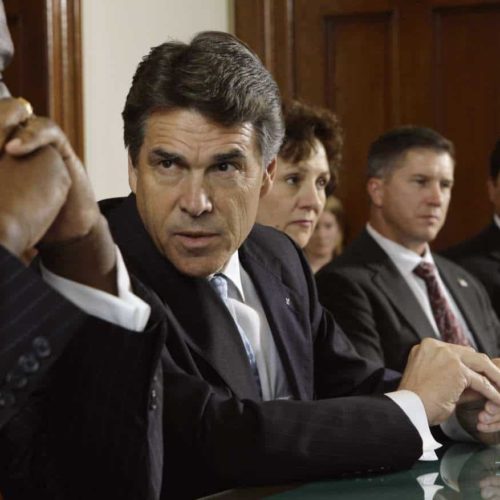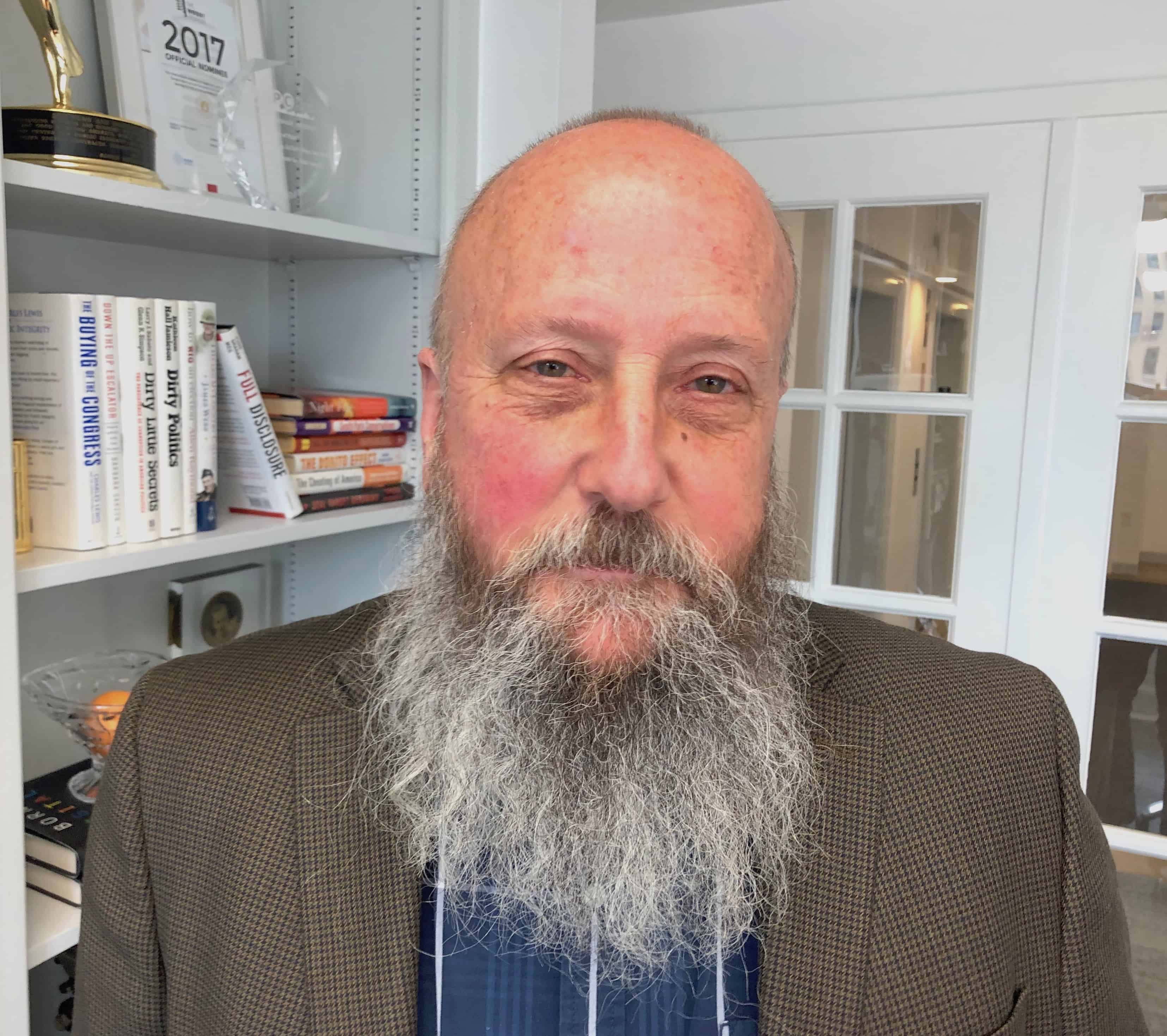Introduction
What would President Rick Perry’s environmental agenda look like?
For clues, one need only examine Perry’s record as governor of Texas, where the chairman of the state environmental agency writes vitriolic letters to the U.S. Environmental Protection Agency and questions the science behind climate change.
Bryan Shaw, a 2007 Perry appointee to the Texas Commission on Environmental Quality who became the agency’s chairman in 2009, opined in a guest column in the El Paso Times last month that a new EPA rule designed to reduce cross-state air pollution from coal-fired power plants was in fact “aimed at cutting Texas jobs, cutting Texas economic growth, increasing Texas energy costs, and harming Texas energy security.”
The column closely followed a statement by Perry himself, who called the rule “another example of heavy-handed and misguided action from Washington, D.C.”
Perry’s gubernatorial campaign received more than $5 million in contributions from energy companies and their employees during the 2009-2010 election cycle, according to data compiled by the nonpartisan National Institute on Money in State Politics. Among Perry’s largest contributors during the cycle: Houston oilmen Jeffrey Hildebrand and Gary Petersen , and Valero Energy Corp. Oil and gas companies consistently are among the state’s biggest polluters.
Perry recently told the Christian Broadcast Network that he prays for President Obama every day, asking in particular that “his EPA back down these regulations that are causing businesses to hesitate to spend money.”
Shaw, in June 30 testimony before the a Senate clean air and nuclear safety subcommittee, attacked another EPA rule meant to limit emissions of mercury and other toxic compounds from coal- and oil-fired power plants. Shaw maintained, among other things, that “any health benefits [from the rule] would be insubstantial compared to the cost of regulation” and expressed concern that “the reliability of the Texas electrical power system will be severely compromised.”
And in a testy letter to EPA Administrator Lisa Jackson and Regional Administrator Al Armendariz a year ago, Shaw and Texas Attorney General Greg Abbott said they would defy EPA regulations – stemming from a 2006 U.S. Supreme Court decision, Massachusetts v. EPA – requiring Texas to begin issuing permits for greenhouse gas emissions from industrial sources.
Shaw declined Wednesday, through a spokeswoman at the agency he chairs, to be interviewed by iWatch News. Catherine Frazier, a spokeswoman in the governor’s office, said “the governor is proud of [Shaw’s] leadership and expects he will put Texas’s interests at the top of his decision-making.”
Frazier said that Perry, like Shaw, finds the science linking human activities to climate change to be “very questionable.” The EPA, she said, “continues to impose burdensome, job-killing mandates on Texas and the governor believes there needs to be a balanced approach to protecting jobs and protecting the environment. Texas has created a model for how to accomplish that goal.”
Environmental activists in Texas say they grew worried about Shaw when he disclosed during his 2009 confirmation hearing that he didn’t believe the science on climate change was “fully settled.”
“He denies the science no matter what it is – climate change, ozone, mercury,” Jim Marston, director of the Environmental Defense Fund’s Texas office, said of Shaw. “All the other scientists around the world are wrong. Somehow, the laws of physics and chemistry don’t apply in Texas, apparently.”
“Adhering to the party line is [Shaw’s] guiding compass,” said Matthew Tejada, executive director of Air Alliance Houston, an environmental group that closely follows the commission Shaw chairs. “Every decision, policy, program or position that the TCEQ takes at the commission level is being guided by that compass – what can it do to strike back at an imaginary federal foe and what can it do to coddle industry here in the state.”
Shaw is a former associate professor in Texas A&M University’s Biological and Agricultural Engineering Department. His views on global warming contrast sharply with some of his former A&M colleagues – notably, the entire Department of Atmospheric Sciences, which declared in a statement several years ago that it is “very likely that humans are responsible for the recent warming.”
Loathsome though it may be to environmentalists, Shaw’s and Perry’s anti-EPA posture sits well with at least some members of the Texas business community.
“I think our political leaders in the state have done an excellent job protecting the environment while allowing the state’s economy to flourish in the past 10 years,” said Alex Mills, president of the Texas Alliance of Energy Producers. The EPA, under Obama, has “gone wacko,” Mills said, adding that a Perry administration would feature a “much more hands-off approach” to environmental regulation.
What some critics find most worrisome is Perry’s apparent willingness to reward major donors.
In 2009, the TCEQ approved a low-level radioactive waste dump for Andrews County in West Texas. The dump, expected to open next year, will accept waste from Texas and other states and be operated by Waste Control Specialists, owned by Dallas billionaire Harold Simmons.
Records show that Simmons and his wife have donated roughly $1.2 million to Perry’s campaigns since 1998, according to the National Institute on Money in State Politics. In 2004, Simmons helped finance the “Swift Boat” ads attacking the military record of Democratic presidential candidate John Kerry.
Karen Hadden, executive director of the Austin-based Sustainable Energy and Economic Development (SEED) Coalition, fought licensing of the dump, saying radioactive leakage threatens groundwater and could lead to serious transportation accidents. The term “low-level” is a misnomer, Hadden said; in fact, the dump will take everything but uranium fuel rods from nuclear power plants and plutonium components of nuclear bombs.
An eight-member TCEQ team unanimously advised against licensing the facility in 2007 but was overruled by top-level managers (not including Shaw). Three members of the team, including Glenn Lewis, left the agency in protest.
“We came to the conclusion that it was an unsuitable site geologically because of the immediate vicinity of groundwater,” Lewis told iWatch News. Nonetheless, he said, “We were immediately instructed to begin drafting a license” for Waste Control Specialists.
Asked if he believed Simmons’s relationship with Perry was behind the order, Lewis said, “I’m 99 to 100 percent sure. From the first day I reported for duty on this team, the other members were quite resigned to the fact that if Simmons is behind this, he’s going to get his license.”
The company and the candidate deny any favorable treatment.
“I think the record’s pretty clear there is absolutely no evidence of special treatment of any kind,” said Chuck McDonald, a Waste Control Specialists spokesman. “The licensing process was a long and arduous one. It took five years.”
Frazier, Perry’s spokeswoman, said the Andrews County dump “is supported by that community. It’s a project that will create jobs and bring them economic development opportunities.”
Questions also were raised about a 2005 Perry executive order expediting the state permitting process for coal-fired power plants. At the time, a Dallas-based utility and major Perry contributor, TXU, wanted to build 11 such plants; plans for eight of the 11 were scrapped in 2007 after TXU was acquired by two private equity groups.
In 2008, The Center for Public Integrity and Fort Worth Weekly reported that TXU’s coal plants exceeded federal emission limits nearly 650 times between 1997 and 2006, putting more than 1.3 million pounds of lung-damaging sulfur dioxide into the air.
A growing body of science suggests greenhouse gases produced by human activities – chiefly deforestation and the burning of fossil fuels – are responsible for shifting temperatures and other changes in climate across the globe that could threaten people and wildlife and exacerbate international frictions over scarce resources.
Read more in Environment
Environment
Plastics industry edited environmental textbook
In 2009, a Calif. school district added new section to a textbook titled ‘The Advantages of Plastic Shopping Bags’
Environment
FACT CHECK: Anti-Obama ad based on “unsound” industry-funded study
Ad inaccurately claims Obama administration has put 7M jobs at risk through environmental regulation


Join the conversation
Show Comments